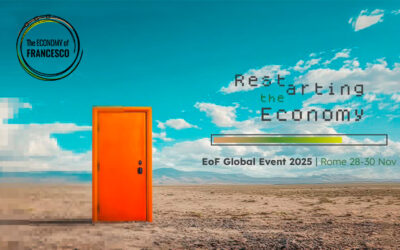 The Indiction of the Jubilee of Mercy has taken the word “mercy” far beyond Vatican walls, and to the ears of the secular world it can sound outdated and laden with religious significance. The nonbeliever tends from the start to not accept the mystical meanings with which this word is usually invested, especially now as it is raised to disturbing centrality in worldly society. The nonbeliever finds synonyms, or presumed synonyms, that would allow the word to be taken beyond the borders of Christianity: pity, compassion, empathy . . . in a growing confusion that the online dictionaries are not able to reduce. The first impulse is to identify it with “pity,” the sentiment of people with “compassion,” of people who emotionally perceives the sufferings of others as their own and would like to alleviate them (and, by the way, in Christianity the term “pity” is close to the term “mercy”.) Well, then, why not “empathy” which is not a feeling but an ability to fully understand the state of soul of others, to place oneself in someone else’s shoes especially after the discovery by neurosurgeons on the mirror neurons that tends to confirm that empathy does not have its origins in intellectual effort but in the genetic code of the species? Words such as pity, mercy compassion, like all respectable words, will have their positive and negative meanings. Just think of the derogatory meaning of phrases such as: “I feel pity for you;” or “I pity you;” “He needs to be pitied.” What about the misericorde weapon that was used in medie-val times to deliver the death stroke, the “mercy stroke”? You will say that “mercy” is compassion, yes, but “active” compassion that is substantiated by action, by works. And it may be that it represents a fundamental concept, which is key to the Christian life, as the Dr. Cardinal W. Kasper underscores. Well, then you would need to distinguish between a Christian mercy and a secular mercy based on humanitarian values which, while they march side by side and intertwine, nevertheless belong to two different orders that are to be re-spected in their nature. Therefore, it is not a matter of contrasting secular good works with Christian good works, but of “searching for that hidden harmony that brings relief to the world;” and harmony – like dialogue – “is not given in homogeneity, but it lives in diversity. . .” Mario Frontini
The Indiction of the Jubilee of Mercy has taken the word “mercy” far beyond Vatican walls, and to the ears of the secular world it can sound outdated and laden with religious significance. The nonbeliever tends from the start to not accept the mystical meanings with which this word is usually invested, especially now as it is raised to disturbing centrality in worldly society. The nonbeliever finds synonyms, or presumed synonyms, that would allow the word to be taken beyond the borders of Christianity: pity, compassion, empathy . . . in a growing confusion that the online dictionaries are not able to reduce. The first impulse is to identify it with “pity,” the sentiment of people with “compassion,” of people who emotionally perceives the sufferings of others as their own and would like to alleviate them (and, by the way, in Christianity the term “pity” is close to the term “mercy”.) Well, then, why not “empathy” which is not a feeling but an ability to fully understand the state of soul of others, to place oneself in someone else’s shoes especially after the discovery by neurosurgeons on the mirror neurons that tends to confirm that empathy does not have its origins in intellectual effort but in the genetic code of the species? Words such as pity, mercy compassion, like all respectable words, will have their positive and negative meanings. Just think of the derogatory meaning of phrases such as: “I feel pity for you;” or “I pity you;” “He needs to be pitied.” What about the misericorde weapon that was used in medie-val times to deliver the death stroke, the “mercy stroke”? You will say that “mercy” is compassion, yes, but “active” compassion that is substantiated by action, by works. And it may be that it represents a fundamental concept, which is key to the Christian life, as the Dr. Cardinal W. Kasper underscores. Well, then you would need to distinguish between a Christian mercy and a secular mercy based on humanitarian values which, while they march side by side and intertwine, nevertheless belong to two different orders that are to be re-spected in their nature. Therefore, it is not a matter of contrasting secular good works with Christian good works, but of “searching for that hidden harmony that brings relief to the world;” and harmony – like dialogue – “is not given in homogeneity, but it lives in diversity. . .” Mario Frontini
Yes to God
Yes to God




0 Comments